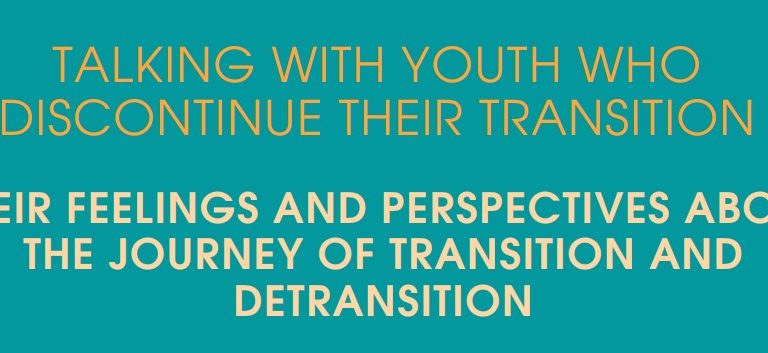The following post is republished with permission from @elizamondegreen
You can find Eliza on Twitter and read her Substack here. Eliza is a grad student with a research interest in gender identity and social media influence.
New Factsheet Summarizes Key Talking Points
The Canada Research Chair on Transgender Children and their Families just released a new factsheet entitled “Talking to youth who discontinue their transition.” Unsurprisingly, the researchers dutifully recycle all the talking points that gender-affirming clinicians fall back on when transition fails:
Citing that favorite stat: “less than 2% of people who have had a gender-affirming surgery express regret.” [Never mind the high loss to follow up, demographic overhaul, and near-total collapse of medical gatekeeping…]
Putting “detransition” in air quotes.
Washing hands of bad medical outcomes:
Detransitioning shouldn’t necessarily be thought of as a “clinical ‘failure.’… Discontinuing a transition does not always mean that the transition shouldn’t have occurred.”
Framing detransition as part of a patient’s “gender journey”:
“Some people who stop their transition say it was a necessary step in their development and identity consolidation… 14 [out of 20] expressed positive feelings in the present about their transition journey… 7 expressed mixed feelings about their transition journey and showed ambivalence toward their journey through the different nuanced feelings (both negative and positive) expressed simultaneously in the discourse… 6 have accepted the journey and came to terms with the changes they experienced. They do not wish to fuel regrets, or they would not want to go back in time to do things differently… “Youth’s perspectives evolve through time and tint the way they feel about the choices they made. There can be expression of regrets, gratitude and growth resulting from the transition, detransition or both depending on the moment or stage of their journey they are commenting on. Youth’s feelings appear as a continuum of rich and nuanced experiences which are constantly evolving as they impact their current experience. The process of transitioning, even if it no longer satisfies the youth, may have contributed to deconstructing what gender is and helped the individual flourish during their gender journey.”
Canada Research Chair on Transgender Children and their Families “Fact Sheet”
Treating medical transition (undertaking experimental interventions in pursuit of an impossible goal of changing sex) and detransition (accepting your sex) as equivalents:
“18 shared themes of self-acceptance, liberation and blooming after their transitioning & detransitioning journey [at which stage of this blessed journey, I wonder?]. Those participants commonly expressed feeling good about their journey. They report feeling better since detransitioning and liberated from the weight of gender expectations and the judgment of others. Most youths shared feeling more comfortable with their assigned gender and/or body.”
Making nonsensical claims like detransition isn’t a “gender shift,” it’s just a shift in your gender:
“Detransition doesn’t always appear as a gender shift, sometimes it brings change to the meaning youth give to their gender, and therefore their needs evolve. Discontinuing a transition does not mean “going back” to their pre-transition gender identity or to their gender assigned at birth (A=>B=>A). Indeed, youth express a large range of identities and some now describe themselves as fluid, neutral, nonbinary or don’t even identify to a gender anymore (A=>B=>C).” [You can see the researchers straining to keep detransitioners in the framework that underlies gender identity and medical transition here… later, researchers talk about the “‘detransition’ umbrella,” which seems like yet another way to minimize the links between detransition, regret, and clinical responsibility.]
The researchers quote just one detransitioner, a 21-year-old detrans woman. But I’ve talked to a lot of detransitioners and it’s hard to imagine this was the most insightful comment the researchers gathered:
“It’s like, I’ve cared, like, I’ve cared a lot, much less about, like, gender stuff in a, in a general sense.”
???
Important Study Findings
Nonetheless, researchers admit some troubling findings, even as they attempt to contain the fallout:
Underlying issues were not resolved by transition and resurfaced: “16 expressed challenging feelings emerging or ongoing during their detransition. Almost half of the participants say struggles from the past have come back to the surface or remained after their transition was discontinued (i.e., depression, gender dysphoria, body dysmorphia, eating disorders).”
“11 [out of 20] say they wished they had better support from professionals, so they could’ve had more clarity on these issues and explored alternative solutions.”
“12 expressed negative feelings when recalling their transition such as explicit regrets about having done a transition or the desire not to have done some interventions related to their transition. Some youth expressed feelings of sadness, grief, depression and missing their body pretransition and some expressed anger. Some reported discomfort with the changes caused by their transition (e.g., vaginal atrophy) and some went on to develop a new form of gender dysphoria.”
“We need to reflect on the ways we could promote gender-affirming approaches to explore how we can further address issues experienced by the youth as well as rethink the notion of regret in youth who detransition. Stopping a transition can be challenging, which raises the question of how do we support detransitioned youth?”
The study findings warrant more investigation. It appears, however, that the Canadian Research Chair on Transgender Children and their Families is more concerned about framing a narrative about youth who “discontinue their transition”. For some more critical thought about this topic, Michelle Alleva has this to say about controlling the narrative on detransition:
How does one frame a failed treatment as anything but a bad outcome?
Well, they don’t see it as a failed treatment. They see it as having been provided a service that didn’t meet expectations. It’s not a bad outcome; it provided what you asked for. There is no problem with the system; the problem is you.
I do, however, see it as a failed treatment. It was prescribed by doctors and facilitated by mental health therapists. These are not people who simply dole out a service. They are people who help us maintain health and who treat the sick and unwell. They take an oath to “first, do no harm.” I should have been able to trust them to make decisions that would enable my long-term health, even if they advised against what I wanted.
Maybe I still would’ve transitioned if it was advised against. Who knows? Perhaps if negative outcomes of transition were more widely talked about, I would have been deterred from going forward instead of expecting transition to solve all my problems. But it’s pointless to imagine myself into a different culture. Instead I am focusing on what can be done to change the culture now.
Michelle (Canadian detransitioner)



